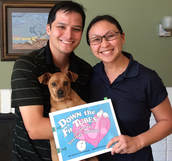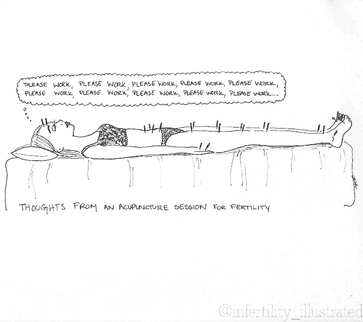 I’m so excited to introduce you to Christine of Infertility Illustrated. Currently working in corporate communications in Chicago, Il., Christine studied illustration in college and is using her talent to share what it’s like to deal with infertility. Drawing true-to-life, funny, and insightful representations of her experiences, anyone that has gone through infertility or is currently going through it will find her work relatable. Head to her Instagram page to find more amazing illustrations: Infertility Illustrated You started Infertility Illustrated in August 2017. What motivated you to do so? We'd been trying for a few years and I've been pretty ignorant about the greater fertility community out there. I was sitting at my desk and just thinking about how my husband was once again starting this exciting new chapter professionally and coincidentally I was having another miscarriage. And it was just the two things contrasted with each other that made me draw a quick little sketch and share it on instagram. You surpassed 1,100 instagram followers in 5 months, what kind of feedback have you gotten regarding your posts? It seems like a lot of the illustrations are really relatable and that's what I was hoping for! I really wasn't expecting much at all. My goal is to show "a day in the life of infertility" and what it's like to deal with all the stuff we deal with. So, I'm just really glad people are enjoying my pictures! Is there an illustration that you’ve found resonates the most with people? I don't know if there is one in particular that resonates with people the most, but overall, I think the illustrations that are the most relatable are the ones showing just those everyday thoughts and feelings where you're just silently praying to yourself that acupuncture will help you or you're just upset because someone's pregnant with their second child and you can't even have one. In your first post you list your infertility “creds.” What has the medical process been like for you? It's been really, really long. I'm so tired of it, you know? We're not ready to give up, but it's been really exhausting. The roller coaster really is the best way to put it. I've heard that analogy a lot and it's so true! Your emotions are constantly going up and down with each new cycle. I never would have thought we would have had to take this road as far as IVF and beyond. I guess maybe I was a little naive because even with IVF I was pretty convinced it would work on our first try. I think educating yourself is a slippery slope, or at least it was for me. When I started to read stories of people who had to do multiple rounds of IVF I sort of had that eye-opening, panicked feeling of "oh my gosh, this could potentially go on a lot longer." Are you trying anything beyond medical interventions? I've tried acupuncture in the past, but it started to get a little expensive. We have to pay out of pocket for all of our medical costs so it gets hard to afford everything you want to do. I've also incorporated maca powder into my diet and last year I gave up coffee and alcohol for most of the year in the hopes that maybe all those things would help. But this year I'm back on both coffee and alcohol, they help keep me sane! What has been most helpful as you navigate your path? It was really great having a doctor that I trusted and knew I could contact (and would get back to me immediately) about anything. I'm in Chicago now, so with a new doctor, but my doctor in Virginia was amazing. She got me through 2 ectopic pregnancies, IUIs, IVF, and FETs and she was the best! Having doctors and nurses who genuinely care about you is so important and makes everything a little bit easier to handle. What has been hardest for you during this time? The hardest thing this past year was going through IVF alone. My husband deployed (he was in the Navy) on the day I started IVF and after the IVF coordinator went through all the instructions for everything I just started bawling in her office because I was going to have to do it alone. So I was mixing my medications, administering my shots, and then dealing with the heartbreak of failure on my own and that was really hard. Infertility is a couples' issue and a lot of the time in the past year I was by myself. Granted, I chose to do it by myself, I could have postponed IVF until he came back from deployment, but when you've been at this for so long you don't want to have to keep putting it off. How is your partner dealing with this process? He has been really supportive and understanding. He hates that he hasn't been there for me as he should have this past year, it was pretty hard and frustrating for him. He's a guy that likes to "fix things" so when he can't fix this, he'll just go around and look for other things to fix around the house. I think it's his own way of dealing with the stress of all this. We often field ridiculous things from people we know and love (and sometimes from complete strangers). What is the least helpful thing someone said to you? Ugh I feel like there have been so many and I can't even pinpoint one now. When I had this last miscarriage, I went to a general OBGYN because I didn't have a doctor in Chicago yet and she said "you know you can stop"...as in you know you can stop doing fertility treatment. At the time I found it incredibly callous because I was literally in the middle of a miscarriage and so sad and here's this doctor telling me I should maybe give up. Not at all helpful. What is the most helpful/supportive thing someone said to you or did for you? My friends and family have all been really, crazy supportive so I hate to single any one situation out. When my husband was deployed, my mom drove 8 hours for the weekend to be with me when I had my IVF retrieval and my brother came down and waited on me when I had my first frozen embryo transfer. My amazing neighbor and friend brought me groceries and picked up my medicine when I had OHSS and could barely walk and she took out my trash for me, which was a small thing, but really sweet! My sister bought me a bracelet that says warrior. So, I've had a lot of support and I'm pretty lucky there! What would you like others to know about your experience thus far? I don't think there is any one thing I would want people to know about my experience. My biggest thing is to take care of yourself! Infertility sucks so you have to take time to do the things that make you happy! What advice would you give to someone about to begin the process of infertility interventions (medical or otherwise)? Brace yourself. It could be easy or it could be a really long road. Try to take everything in stride, one cycle at a time. And again, you do you! Don't let anyone pressure you into anything!
0 Comments
 I want to introduce you to an amazing couple: Virginia and Tom Hanada. High school sweethearts from Portland, Oregon, Tom is a professional writer and Virginia is a professor of Child Development and published researcher. Beyond these accomplishments, they have also published a book, one that I encourage anyone going through infertility to read. And buy extra copies of so that you can hand it to people when they ask, “so when are you going to have kids?” You can find the Hanadas on Facebook, Twitter, or Instagram Virginia has also recently started a website: https://angryladybits.blogspot.com You wrote, Down the F’n Tubes: an ode to fertility futility. It’s a book that accomplishes many things: it gives those with no infertility experience insight into what it’s like; it gives those that have had experience a chance to feel understood and less alone; and it helps brings humor to a crappy situation. How did the book come about? During our long, early morning drives to and from infertility appointments, we’d talk about my lady bits as though they were characters. “Ugh, the endometriosis is like a tentacle monster, getting all up in there”. “ANOTHER cyst? They're like sea monsters wedging their way into a bathtub.” Imagining these obstacles as characters made it funny. Bearable. We started toying with the idea of turning our experiences into an illustrated humor book. We just didn’t know how. And then we came across Dr. Seuss’ “Oh, the Places You’ll Go!” There are moments in that book where he discusses “the waiting place” and “failure” and all these concepts that are so much more poignant to us now. We realized that Seuss’ lyrical, imaginative style was the perfect format to tackle complex topics and emotions, and make a very individual experience universally relatable. Ultimately, that was the goal – to make the world understand how infertility FEELS. Not to mention that it was fun to write a bunch of rhyming sex puns. So often the partner’s voice is left out of the process. Down the F’n Tubes really captures what it’s likes for the both of you. Can you talk about how each of you has handled your infertility journey? Regardless of whether infertility is male-factor, female-factor, or unexplained, women are burdened with most of physical aspects of infertility: blood tests, ultrasounds, medicine, injections, miscarriage, etc. However, the psychological anguish and frustration is a shared experience. We wanted to address that by including both perspectives. Writing this book together helped us cope with infertility because it was something we could control. I’m as Type A as you can get! I pack at least 1 week before leaving for a trip and figure out vacation plans months in advance. Infertility stripped control from our lives because we couldn’t plan a day in advance, let alone a week. After a couple of years of this, I felt like a shell of the person I was before we started trying to conceive. Not being able to do something we are biologically programmed to do felt like the ultimate failure. It was also incredibly isolating and lonely for us. It seemed like everyone around us was super fertile. We weren’t sharing with a lot of people, so it hurt every time someone asked if we wanted kids or reminded us that we should start having kids because, you know, we’re getting old. Writing this book gave us an outlet to share our experience, and something to look forward to. The book does a great job of using humor to normalize infertility. What else were you hoping to accomplish in writing it? We want to raise awareness about infertility. A lot of people think infertility is uncommon. That it only happens to other couples. We wanted to capture what infertility felt like, from the beginning, so that everyone could relate to it. As others have eloquently written, people dealing with infertility grieve the family they might not have, but they grieve silently and in a vacuum. The book is meant to validate the raw emotions people feel going through infertility, and to remind them that they are more than their infertility. We hope our book reaches people who are struggling with infertility, but more importantly, helps others understand why the people they love who are dealing with infertility feel so broken. This book has also been a great conversation piece in professional settings. When colleagues ask the “When are you having kids?” question, instead of fumbling around with a “Oh, uh, we’re, uh, thinking about that…” we can confidently say, “We actually just published a book about infertility. And because you asked that question, you now have to buy it.” That little joke opens up conversation and awareness, and teaches people valuable lessons in tact (and they often end up buying the book out of guilt, so there’s that!). Down the F’n Tubes is certainly helpful to others. What has been most helpful to you both while going through this process? Honestly, writing this book saved our sanity. It was so hard to process the emotions we were feeling. We needed to vent. We needed to scream “FUCK SHAME” as loud as we could to as many people as we could. Infertility had started consuming our lives and our self-image. But once we started working together on this story, we realized that we had found a way to define infertility instead of being defined by infertility. And the conversations it has sparked have been incredible! After we started sharing the book, so many friends and family members began confiding their own infertility struggles to us. Some of these friends have Facebook pages filled with pictures of their children; we had no idea the pain and heartbreak they experienced to have these families. It’s a shame that no one talks about the struggle. It can be so demoralizing when everyone on Facebook has children with seemingly no effort. Once we started to have these conversations with other people, it alleviated so much of our emotional burden. We realized we weren’t alone. What has been the hardest? The uncertainty and lack of control was really hard. Every ultrasound took 3 hours out of our day, and sometimes we wouldn’t know if we needed an ultrasound until the day before. One week we had to go FIVE TIMES. If we didn’t have flexible schedules and accommodating jobs, this would be impossible. Even so, we felt really guilty and unproductive in our careers, careers that we have worked towards our whole life. A commonality among those going through infertility is fielding ridiculous comments from others. A near stranger told my husband to “just flip her over.” Your latest Instagram post says, “So the next time you tell someone to relax so they can get pregnant, STFU. Please and thank you.” Is that the most absurd thing you’ve heard or has someone said worse? Funny enough, an early draft of the book had an entire section of bad advice that we unfortunately had to cut for space and story flow. But here are some of the rhymes that hit the cutting room floor: Their family and friends couldn’t help but be nice, With a whole fucking stork of unwanted advice. “Smile! You can’t make strong eggs if forlorn.” “Your sperm are more active if you watch gang-bang porn.” “Don’t eat cheese, don’t eat fish.” “How ‘bout coffee?” “You wish.” “No laptops on balls.” “Wait two days ‘tween each wad.” “Don’t bike, you might fall.” “Have you tried asking God?” Those are all actual conversations… yes, even the gang-bang porn one. To be fair, people can also be amazing and seem to know just what to say. What has been the most helpful or supportive thing someone has said to you? “I’m sorry, that sucks” is the most supportive thing our friends have said to us. That’s because there’s no unsolicited advice, judgment, or pity. It also meant a lot when friends affirmed that we don’t need biological kids (or kids, for that matter), to be considered a family. We are a family. At the end of Down the F’n Tubes, you write, “A life without trees can be happy and complete. Because sometimes it’s hard to get gametes to meet.” The most helpful thing my therapist ever said to me was that I’d have my family. Whether it was IVF, adoption, surrogacy, or not having kids, I’d create a family. I think what you’ve written there is a reflection of that and really hit home for me. Can you talk a little more about this? I LOVE what your therapist said. There is so much truth to that statement, and it’s an important perspective to maintain. In fact, the field of child development defines family as two or more persons related by birth, marriage, adoption, or choice who have emotional ties and responsibilities to each other. Tom and I became a family once we made a commitment to each other. We just had the desire to expand it. We all start with an idealized version of what our family will look like. But infertility is one of those things in life that just isn’t fair. It sucks. It’s frustrating. It upends all of our well-laid plans. But it’s not the end. How couples attack infertility is their choice, and all choices should be respected. But it’s important to not lose yourself in the process. Always keep perspective and don’t lose sight of the things you have in life. What would you want to tell someone who might be at the start of their infertility journey? It’s easy to lose yourself in the day-to-day, cycle-to-cycle frustrations of infertility. We want to remind others that infertility does not define you, and it is not your fault. Don’t let it control your life or take away your joy or accomplishments. And be sure you have open, honest conversations with your partner about finances and expectations. And most importantly, remember that you are not alone. No matter what your Facebook feed tells you, no matter what your mother-in-law tells you, no matter how it feels at 7am when you’re getting your third ultrasound for the week, always remember that you are not broken, you are not a failure, and YOU ARE NOT ALONE.  Recently, I posted an account in my personal stories section, written by Amira Posner. I asked Amira if I could also write something about her website, as I think it is an amazing resource that deserves attention. If you are in the Toronto area and are struggling with reproductive issues, you are in luck. She practices in the area and hosts a Mind-Body Infertility group. If you’ve read any of my interviews with the Specialists, you know that the Mind-Body connection is integral to one’s reproductive health. If you’re not in the area, fear not, she offers Skype and phone sessions as well. But what I really want to highlight is something that first drew my attention to her work. She offers a service called “Fertility Friend.” From her site: Going through Infertility can feel very isolating. Often, it seems like nobody understands. Healing Infertility has started a new program called “fertility friend.” If you are struggling with infertility and want to connect with someone who is also going through the experience, join our fertility friend program. We call it one on one “peer support.” Get yourself connected and supported. If you are going through IVF treatment, we can also put you in touch with someone who has gone through the same treatment. Our own history in this field has shown us that communication through a peer support programme like fertility friend can be valuable to a person feeling isolated and suffering with the difficult emotions that come with this experience. As the name suggests, Infertility Out Loud is intended to give a voice to people going through infertility and all things related to it. To me, Fertility Friend is a perfect representation of what IOL stands for-connecting people through common experience and bringing solace through feeling “heard.” The tag line of my site, taken from my bio: reads “because relating to others is a powerful tool.” Fertility Friend enables you to relate to someone and to use that tool to help you along your journey. If you come here looking for support, I hope you will also go there to find even more. Visit Amira and Fertility Friend here.  A new medical study was presented this year at the annual American Society for Reproductive Medicine by Fertility Centers of Illinois and Pulling Down the Moon. It's a must-read for anyone dealing with the stress of infertility and/or miscarriage. As someone who found Pulling Down the Moon's yoga program really helpful while going through treatment, I believe these findings are not only exciting but important for those struggling. New Study Uses Yoga to Quickly Reduce Stress During Fertility Treatment Authors: Beth Heller, Creator of the Yoga for Fertility™ Program and Co-Founder of Pulling Down the Moon Dr. Hirshfeld-Cytron, Director of Fertility Preservation and Reproductive Endocrinologist at Fertility Centers of Illinois Anyone who is in the midst of treatment knows that between the appointments, injections and hormone rollercoaster, stress is bound to come along for the ride. If you are struggling to carve out some “you” time to decompress, new research around yoga and stress among fertility patients will offer hope and relief. In a new study by Fertility Centers of Illinois and Pulling Down the Moon, online yoga and in-person yoga were found to be equally effective in reducing anxiety among the most highly stressed infertility patients - those who have undergone at least one IVF cycle without success or have experienced miscarriage after IVF. Not only did stress relief happen quickly, there was a significant reduction - up to 26 percent after a six-week online yoga program and 23 percent after an in-person yoga program. Yoga practice occurred weekly and while both groups followed the same yoga class, the online participants followed a DVD rather than attending a yoga studio. Group discussion followed yoga class while the online group met weekly on a video application. Both groups followed the Yoga for Fertility™ program. The study was born out of the goal to treat both the emotional and physical challenges of treatment in order to reduce stress and reverse the 40 percent treatment dropout rate, helping patients achieve success. With infertility causing the same intense stress as a cancer diagnosis, having an accessible and effective stress reduction tool is critical. Yoga is one of the most accessible stress reduction options available and this study proves that significant results can happen, even from your bedroom in your pajamas. To help everyone access the benefits of yoga and group discussion during treatment, we’ve put together a helpful Q&A section of common questions we are asked about the study: How is yoga helpful for stress? Yoga, a low-intensity form of exercise, works on the physical body. Through stretching and bending the spine and limbs and emphasizing deep diaphragmatic breathing, it is believed that the body’s relaxation response is mechanically stimulated. It has been hypothesized that yoga poses and breathing exercises stimulate the vagus nerve, a large nerve running the length of the spine that is a key regulator of our body's parasympathetic nervous system (PNS). The PNS in turn stimulates the relaxation response. How does infertility affect mental health? Infertility is isolating and very few people talk about their experiences. Women often feel sadness, guilt, shame, anxiety and depression. Sadly, 30 percent of IVF patients suffer from anxiety and depression, with studies showing that an infertility diagnosis causes the same amount of stress, anxiety, and depression as an HIV or cancer diagnosis. These challenges can lead to patients discontinuing treatment before experiencing success. How can group discussion help women? Group discussion and support are critical for women experiencing infertility. Being with others experiencing similar challenges immediately provides a support network and reduces isolation. Being around others who “get it” is validating, reassuring and energizing. What does the group and online discussion entail? The 45-minute group discussion centers on how to apply different yoga techniques such as breathing, meditation, and working with negative thoughts to the fertility journey. Women are taught to reconnect to their body in a loving and compassionate way, use breath awareness to release tension and re-energize, and are provided a framework for addressing the negative thoughts and beliefs that accumulate. Women are also invited to reconnect to their lives with a more relaxed and present-focused attention. And we make sure to do a whole lot of laughing. How have participants described the study and their results overall? One participant realized that racing downtown to attend a yoga class was going to cause more stress than it was going to reduce, so she joined the online course. In her own words, she explains, “It has been absolutely wonderful! A community of women on the same journey as I am. Even though I have never and probably will never really meet them face to face I feel still that they are my people. My family. My world. This experience has been invaluable to my journey and my life.” What are the implications for the future of fertility care based on these results? Unfortunately, nationwide infertility practices, regardless of patient financial burden, experience patient drop out prior to achieving pregnancy success. The most common reason provided by patients is the stress of the infertility process. With this study, yoga both in person and remote has been shown to mitigate this stress in the most severely stressed patient population. This is extraordinarily powerful as it is a cost effective and convenient way to encourage patients to stay in treatment. What are the limitations of this study? The two limitations that we experienced are the most common challenges all researchers face - participants dropping out of the program before completion and working with smaller participation numbers. Due to lower participation numbers, we cannot make a conclusion about the impact of yoga for stress reduction in regards to pregnancy outcomes. What can women do today to start reaping the benefits? Feeling relief can be as simple as doing this 7-minute Moon Salute Sequence video that follows a flowing sequence of yoga poses especially designed for fertility. We also recommend finding a local support group, joining an online forum or finding a weekly yoga class near you. Karen, a.k.a. Hilariously Infertile, is a teacher and writer who lives outside New York City with her family. Check out free chapters to her book, Hilariously Infertile, on her website hilariouslyinfertile.com , and find her on Instagram and facebook for your daily laugh-out-loud, snarky take on infertility. She will not disappoint. After being diagnosed with PCOS and hypothyroidism, you wrote a book about your experiences with infertility. You've drawn attention to the book (and infertility in general) through your website (Hilariously Infertile) and social media platforms. What inspired you to share what you went through with others?
After the birth of my second daughter I was on maternity leave, and I was helping two of my good friends through their infertility cycles. I knew when they were ovulating, how big each follicle was on each day, all of it. My husband happened to mention in passing that I should mentor women, or write a self-help book for women. So, I started writing. At first, I didn't really know what I was writing. Was it a blog? A book? An article? All I knew was that it was real, and funny, and honest (and not a self-help book like my husband suggested). I shared it with my husband, and a few close friends at first, they all encouraged me to keep writing. Once I realized it was a book, I tried to email literary agents to get a book deal. (So naive.) I quickly learned that I have no connections in publishing. So, a friend suggested that I start a website and social media accounts. This was intimidating to me because I never even had a personal Facebook account (I know, weird right?). I started the website and the social media, got some articles published on FitPregnancy.com and from there it all kinda took off. The more I wrote and posted, the more women were emailing and messaging me from all over the world telling me how I was changing their life. (Nuts!) At first I thought Hilariously Infertile would be a dream that would fizzle out when I went back to work after my daughter. I thought it would reach a couple hundred people and that would be amazing! Incredible even. Then it just grew and grew and the feedback became better and better and more forth coming. I realized that I am really helping women from all corners of the earth get through their day with humor about such a sad subject and that means more to me than any book deal or anything. Recently I posted a submission written by my husband. In it, he talks about how infertility affected him, me and us. When I read it, I laughed, I cried, and…felt some shame. Not from anything he had written, but for the fact that I had always assumed he was fine throughout the process. Or even more honestly, I am not sure I even considered how he felt. I was so mired in my own self-pity that I couldn’t look beyond myself and notice that he was suffering too.
Before I start to sound like a self-centered, narcissistic bitch, I should explain a bit about our relationship. We have been together for a long time. We met in college, and (minus a break-up my junior year that lasted about six months) have been together for 17 years, married 14. Throughout this time, I have been the emotional one, he the stoic. Our differing personalities have served us very well, and particularly well during the years of infertility. I knew I could lean on him, no questions asked, no judgments made. When he told me about a year into treatments, “You should talk to someone, you’re not handling this as well as you think,” I took that as an act of love and concern, not a criticism. I cried, he comforted. I broke down, he held me up. There of course are cracks in this stalwart exterior, such as a particular Johnny Cash song that makes him tear up, and romantic gestures connected to days I wasn’t even aware of (like the 10th anniversary of the day we met). But, in everyday life, he is a rock. My rock. And so, I write to make sure that, if you have a rock too, please don’t forget to check in with him or her now and again. If you are the more emotive one, go ahead and emote right along but at least offer a chance to cry, vent, or just let go. Knowing my husband, I am 99.9% sure he would not take me up on that offer, but I also know that it would mean something to him that I offered it at all. FertiCalm: Calm. Content. And in Control: An App Designed for Women Experiencing Infertility
Several weeks ago, I had the honor of interviewing Dr. Alice Domar. As I mentioned in that post, she is a pioneer in women's health. She is at the top of the field and if you have ever dealt with infertility or other reproductive issues, you should familiarize yourself with her and her work. She has introduced countless research findings to the field and we truly would not have come as far as we have in all things related to fertility without her knowledge, guidance and expertise. And we now have even more to be grateful for. When Dr. Domar first told me about the new App she and Dr. Elizabeth Grill developed, I said it was a game-changer and I truly believe that. If you are currently struggling with infertility, go immediately to your Apple or Android device and download the FertiCalm App. For no cost, (the app is free!), you will find over 50 specific situations that we've all experienced at one time or another while trying to conceive. And this app offers over 500 ways in which to handle these situations. From the Ferticalm website: FertiCalm addresses 50 common and distressing situations which individuals struggling to conceive encounter, and a variety of custom made solutions for each one. For each situation you might face (such as getting your period at work for example), you can click on six different ways to help you feel better. In the moment. As in, right then when you are experiencing the distress. I know this sounds like a paid advertisement, but I assure you it is not. It is just a product that I believe in and wish existed years ago when I was at the height of my infertility issues. It would have been so helpful in navigating so many painful situations. Head here to download on your Apple device. Or here for your Android device.  PROSECCO & PALMTREES is a blog written by Kristy Jassak, a mom in Winter Garden, Florida. On February 5, 2017, she published a post about her infertility journey that hit home for me, as I think it likely will for many others out there reading. Head to her blog to read the touching account below and many other beautifully honest posts. I couldn’t bear to part just yet with my littlest man for a whole week, so we took him along with my parents, on a ski trip to Colorado this week. The full significance of taking Max to Colorado didn’t become fully apparent to me until the plane started its descent and. I saw the jagged mountains to my left and the peaked white roof of this all too familiar airport once again. The first time I visited Colorado I fell in love with its mountains, pine trees, rugged rock formations, amazing food and low humidity (good hair days of course!). I knew immediately I wanted to come back again and again, but had no idea until what circumstances I’d return. Dr. Christopher Sipe is a Reproductive Endocrinologist practicing at Fertility Centers of Illinois. He has been praised by his patients for his empathy and warmth, evident in his desire to help clarify the many questions people have while struggling with infertility. Read on to learn the answers to the these questions.
During National Infertility Awareness Week, April 23 through April 29, Fertility Centers of Illinois are joining millions of women and men struggling to build a family in an effort to promote greater awareness about infertility. According to the CDC, one in eight couples in the U.S. experience infertility and it has been reported that infertility affects 45 million couples worldwide. After trying unsuccessfully to conceive on their own, patients walk through our doors with a lot of questions. In an effort to help others and shed light on infertility, I am sharing the 10 most common questions we hear: “Why can’t pregnancy happen ‘naturally’?” This can happen due to one issue or several. For example, factors including medical diagnoses, lifestyle habits, cancer treatment, prescription medication and excess body weight can make conception a challenge. In other cases, the cause of infertility is unexplained. For women, common infertility issues can include ovulatory disorders, poor ovarian reserve, PCOS, endometriosis, or fibroids. For men, hormonal imbalances and semen issues are common infertility diagnoses. I was recently talking with a friend who had just had her transfer and was waiting on the results. There was so much I wanted to say to her-I wanted to be encouraging and supportive, but also was careful not to get her hopes up too high for fear of the fall if it didn’t work out.
The two week wait. A term that I was blissfully unaware of before I knew anything about ovulation, injections, dye tests, HCG shots, etc. It is an excruciating time and it goes by so slowly, standing still, almost. It is marked by: doing everything in your power to not take a pregnancy test; endless praying; googling “early pregnancy symptoms”; and trying to immerse yourself in minute-by-minute distractions. And yet all you can think about is the two week wait. How many days left? What will the outcome be? Will you be crying happy or sad tears? And how can everyone else in the world just walk around and go about the business of daily life? Even my husband was able to go to work and live like a normal person while we waited. How was this possible? |
|


 RSS Feed
RSS Feed